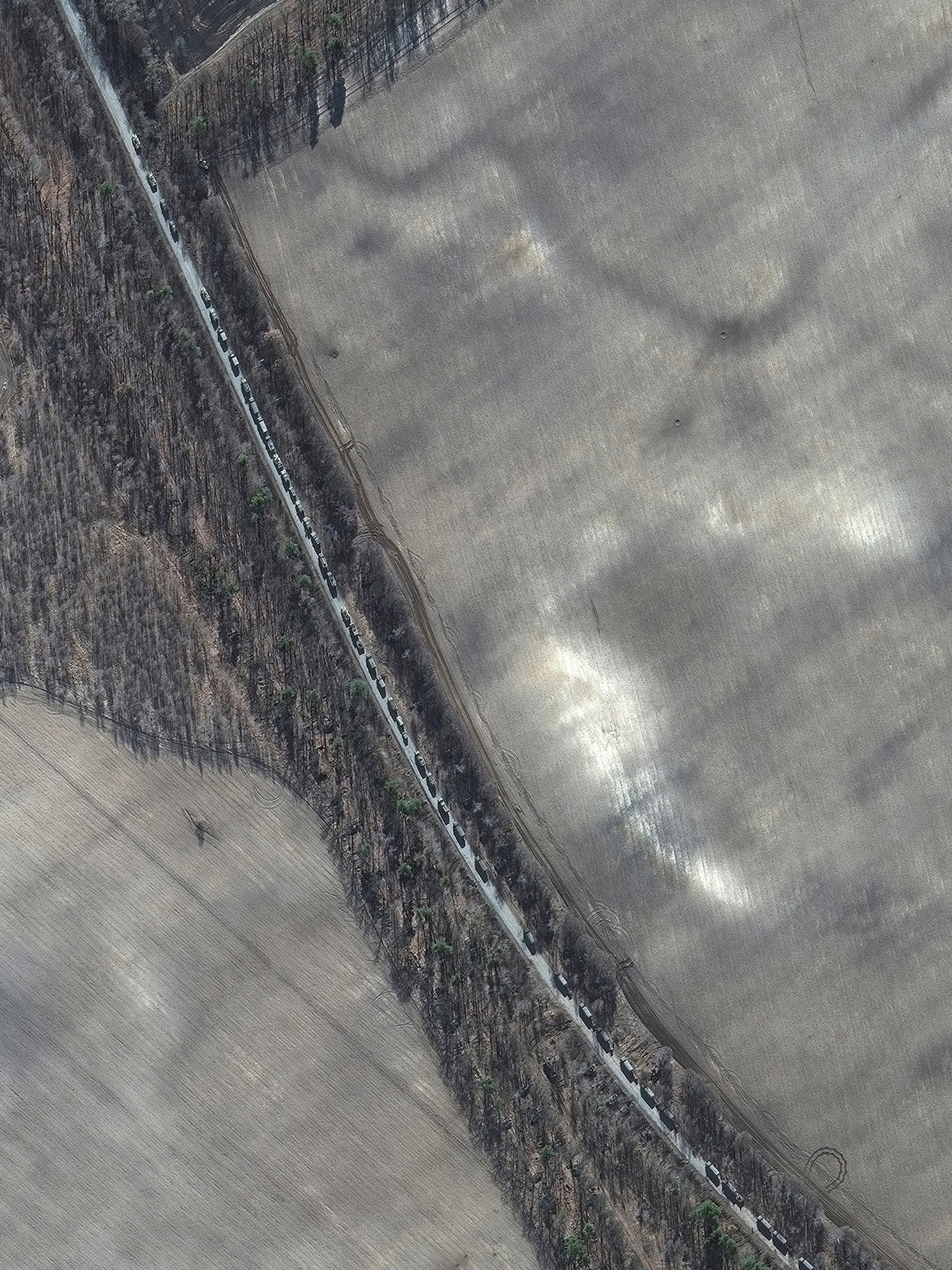Inside Politics: 40-mile long Russian convoy with tanks and artillery advances on Kyiv
Column of tanks, armoured vehicles and logistics cargo snakes its away to capital amid fears Putin could unleash overwhelming force after advance stalls, writes Matt Mathers


As Putin’s war with Ukraine enters day six, Boris Johnson travels to Nato countries sharing a border with Russia in a show of western unity as he vows to make the president “feel the consequences” of his invasion. The prime minister, whose government is coming under increasing pressure to waive visa requirements for Ukrainians fleeing the conflict, will meet his counterparts in Poland and Estonia – who experts fear could be targeted by Putin if his current invasion is successful – and will also pay a visit to UK troops. On the ground in Ukraine, the fighting is intensifying with claims of war crimes after reports Russia used cluster bombs and targeted civilians on Monday. A huge Russian convoy is advancing on the capital, Kyiv. Away from the war, the government’s borders bill has suffered another series of defeats in the Lords.
Inside the bubble
Chief politics commentator John Rentoul on what to look out for:
The Commons sits from 11.30am with health and social care questions. After that Priti Patel, the home secretary, is expected to introduce emergency laws for “unexplained wealth orders”. She may have more to say about UK plans to take in Ukrainian refugees beyond the “immediate family” of Ukrainians already here. Meanwhile Will Quince, minister for children and families, will give evidence to the Education Committee on children in care homes at 10am, while Michael Gove, the levelling-up secretary, will talk to the Public Administration and Constitutional Affairs Committee at 2pm.
Coming up:
– Shadow defence secretary John Healey on Sky News Breakfast at 8.05am
– Deputy PM Dominic Raab on ITV GMB at 8.30am
Daily Briefing
FEARS FOR KYIV: Menacing new satellite images show a 40-mile long Russian convoy consisting of armoured vehicles, tanks, artillery and logistical vehicles slowly snaking its way towards Kyiv, as fears grow that Putin is about to significantly escalate the use of force in the conflict after the first five days of his invasion did not go to plan. The chilling wail of air raid sirens are being heard near the capital again this morning following a reported Russian strike on the outskirts of the city. Ceasefire talks between the two sides took place yesterday in the worst day of bloodshed so far since the invasion began, with dozens killed in attacks on the city of Kharkiv, and more heavy missile attacks on Kyiv, in which a major military radar complex was destroyed. Western allies fear that the increasing use of rockets and tube artillery marks a shift in tactics, and will be stepped up in the coming days.“I fear that the way in which Russia has been frustrated in achieving its aims on the ground is leading to more indiscriminate fire, and as a consequence we are going to see more civilian casualties,” said one official.
WAR CRIMES: Human rights groups and Ukraine’s ambassador to the United States accused Russia of attacking Ukrainians with cluster (illegal under international law) and vacuum bombs, weapons that have been condemned by a variety of international organisations.Amnesty International and Human Rights Watch both said that Russian forces appeared to have used widely banned cluster munitions, with Amnesty accusing them of attacking a preschool in northeastern Ukraine while civilians took shelter inside. Oksana Markarova, Ukraine’s ambassador to the United States, told reporters after meeting with members of the US Congress that Russia had used a thermobaric weapon, known as a vacuum bomb, in its invasion of her country. “They used the vacuum bomb today,” Markarova said after a meeting with lawmakers. “...The devastation that Russia is trying to inflict on Ukraine is large.” A vacuum bomb, or thermobaric weapon, sucks in oxygen from the surrounding air to generate a high-temperature explosion, typically producing a blast wave of a significantly longer duration than that of a conventional explosive and is capable of vaporizing human bodies. We’ll have all the latest developments on our liveblog.
VISA ROW: Priti Patel has said the government is “absolutely working on” the possibility of helping Ukrainian refugees come to the UK. Hours earlier the home secretary ruled out a visa waiver for those fleeing the conflict with Russia over security concerns. Speaking with ITV’s Peston on Monday night, she reiterated statements made earlier in the day about the priority of safeguarding “our public and our people” from “Putin’s Russia”. She added that “further changes” would be announced in the “next few days to help the people of Ukraine, but the current situation was “very fluid and dynamic”. Earlier on Monday, charities and opposition parties accused the government of taking a “heartless and mean-spirtied” approach to the crisis. Yvette Cooper, the shadow home secretary, said: “How on earth is the home secretary so unprepared for something she’s been warning about for weeks?” More than 500,000 people have already fled Ukraine since the beginning of the invasion, and the UN estimates that this figure could reach at least 4 million. Temporary visa concessions announced by the Home Office on Sunday mean that certain family members of British nationals who do not meet the usual eligibility criteria but pass security checks may be granted permission to enter the UK outside the rules for 12 months.
BORDERS BILL LATEST: Policy proposals that are central to Patel’s controversial borders bill have been voted down in the House of Lords, in what campaigners have described as a “victory for compassion”. The Home Office has been urged to “take heed” after peers rejected plans in the Nationality and Borders Bill to penalise and criminalise refugees based on their method of arrival to the UK under clause 11, and to give ministers powers to strip British citizenship without notice under clause 9. Both measures have already drawn widespread criticism, including from prominent Tory MPs.
BREXIT RED TAPE: The government expects its newly signed New Zealand trade deal to damage the UK’s farming industry, according to its own impact assessment. Figures released on Monday show officials expect agriculture and other food related sectors to take a roughly £150 million hit from the new agreement. The official impact assessment describes the change sparked by the deal as a “reallocation of resources within the economy” and a “process of economic adjustment”. Ministers were accused of “selling British farmers down the river” but the trade secretary Anne-Marie Trevelyan said the deal, signed today, “will slash red tape”.
On the record
“The approach we are taking is based on the strongest security advice.”
Patel sets out why she is refusing to waive visa fuels for Ukrainians fleeing war.
From the Twitterati
“What is striking talking to Ukrainians choosing to go home to fight is that they say the same thing – that it isn’t a choice at all. It’s an existential conflict and that they simply must.”
BBC Newsnight policy editor Lewis Goodall speaks to Ukrainians taking up arms.
Essential reading
- Sean O’Grady, The Independent: Putin’s nuclear threat shows just how badly things are going for him
- James Moore, The Independent: The west’s economic sanctions against Russia have plenty of bite for once. Now what?
- William Hague, The Independent: Ukraine’s nightmare is only just beginning
- Tom McTague, The Atlantic: What Zelensky’s courage says about the west
Sign up here to receive this free briefing in your email inbox each weekday






Join our commenting forum
Join thought-provoking conversations, follow other Independent readers and see their replies
Comments